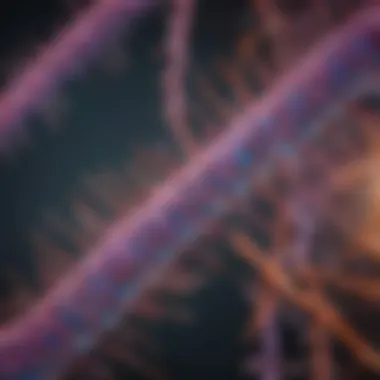Understanding the KRAS Gene: Functions and Implications


Intro
The KRAS gene, an essential component of cellular signaling pathways, plays a central role in regulating cell growth, survival, and differentiation. Mutations in this gene are notably prevalent in various cancers, such as pancreatic, colorectal, and lung cancer. Understanding the intricate functions of the KRAS gene, along with the impact of its mutations, is essential for developing targeted therapies and improving patient outcomes in oncology. This article will delve into the biological basis of the KRAS gene, elucidate the consequences of its mutations, and discuss the latest research trends aimed at understanding its clinical implications.
Key Concepts
Definition of the Main Idea
The KRAS gene encodes a protein that is part of the RAS family of proteins, which are critical in transmitting signals within cells. When functioning correctly, the KRAS protein aids in mediating several cell signaling pathways, including those involved in growth and survival. Mutations in KRAS can cause continuous activation of these pathways, leading to uncontrolled cell proliferation and cancerous growth.
Overview of Scientific Principles
The functioning of the KRAS gene is rooted in its role as a molecular switch. This switch toggles between an active and inactive state, influenced by the binding of guanosine triphosphate (GTP) and guanosine diphosphate (GDP). In its active form, KRAS promotes cell division and survival. When mutated, this regulation is disrupted, resulting in persistent signaling and oncogenesis. Notably, specific mutations such as G12D, G12V, and Q61R have been widely associated with various malignancies, highlighting the importance of understanding these changes.
Current Research Trends
Recent Studies and Findings
Ongoing research into the KRAS gene focuses on understanding the pathways activated by its mutations. Recent studies have shown that targeting KRAS directly can be challenging due to its structure. However, innovative approaches, including the development of small molecules, have emerged, demonstrating promising results in limiting cancer progression. Researchers have also investigated the role of the tumor microenvironment in KRAS-driven cancers, expanding the focus from the gene itself to the surrounding tissue and its influence on tumor behavior.
Significant Breakthroughs in the Field
One of the most notable breakthroughs includes the FDA approval of sotorasib, a drug targeting the KRAS G12C mutation in non-small cell lung cancer. This approval sets a precedent for targeting specific KRAS mutations in therapy. Additionally, combinations of therapies targeting KRAS and other pathways are being explored to enhance treatment efficacy, illustrating the dynamic nature of research in this area.
"The KRAS gene is pivotal not only for understanding cancer biology but also for advancing therapeutic strategies tailored to specific genetic profiles."
"The KRAS gene is pivotal not only for understanding cancer biology but also for advancing therapeutic strategies tailored to specific genetic profiles."
Ending
The KRAS gene represents a crucial focus of cancer research, with its role in various signaling pathways underscoring its importance in oncology. As scientists continue to unravel the complexities of KRAS mutations and their implications in cancer, new therapeutic avenues are likely to emerge, offering hope for improved patient outcomes.
Prologue to the KRAS Gene
The KRAS gene holds a significant position in cancer research, primarily due to its role in various cellular functions and its implications in oncogenesis. Understanding the KRAS gene is crucial for grasping its involvement in tumor development and progression. This section introduces the gene while emphasizing its fundamental importance in molecular biology and medicine.
Definition and Importance
KRAS, or Kirsten rat sarcoma viral oncogene, is a gene that encodes a protein belonging to the RAS family of GTPases. This protein plays a vital role in regulating cell signaling pathways, particularly those involved in cell growth and differentiation. The functionality of KRAS is critical; it acts as a molecular switch that toggles between an active and inactive state, influencing various physiological responses within the cell.
The importance of KRAS extends beyond this basic cellular function. Mutations within the KRAS gene can lead to permanent activation, which is linked to multiple cancer types, most notably pancreatic, colorectal, and lung cancers. Given that KRAS mutations are often present in a significant percentage of these malignancies, recognizing its role provides insight into tumor biology, potential therapeutic targets, and prognostic indicators.
Historical Perspective
The journey of understanding the KRAS gene can be traced back to studies in the 1980s when researchers began to identify its association with tumorigenesis. The discovery of KRAS as an oncogene occurred alongside advancements in molecular genetics that allowed for better identification of gene functions. Initially, KRAS was known for its role in rat sarcoma tumors, but subsequent research revealed its broader implications in human cancers.
Over the decades, research revealed various mutational hotspots within the KRAS gene, pinpointing regions where changes in the DNA sequence frequently occur. These findings not only strengthened the link between KRAS and cancer but also sparked further inquiries into the downstream effects of these mutations on cellular processes.
Today, KRAS is not just a gene of interest but a key focus in personalized medicine and targeted therapy. The historical evolution of KRAS research reflects the ongoing complexity of cancer biology, pushing scientists toward novel treatment strategies and an understanding of resistance mechanisms based on the presence of specific KRAS mutations.


Molecular Structure of KRAS
The molecular structure of the KRAS gene provides essential insight into its biological functions and relevance in cancer biology. Understanding this structure is crucial, as it illuminates how mutations in KRAS contribute to tumorigenesis and various malignancies. Knowledge of the gene's components reveals how it interacts within signaling pathways, impacting cell behavior significantly. This section explores two essential facets: the gene location and composition, as well as the characteristics of its protein product.
Gene Location and Composition
KRAS is located on chromosome 12, specifically at the 12p12.1 region. This precise location is important because it houses the critical elements of gene regulation and expression. It spans approximately 1.7 kilobases in length, containing three exons and two introns. The gene encodes a protein that is part of the Ras family, which plays a pivotal role in transmitting signals from outside the cell to the inside, thereby influencing cell growth and survival.
The regulation of KRAS includes various enhancer elements and transcription factors that contribute to its expression levels. Disruptions in this regulation can lead to abnormal KRAS activation, which is frequently seen in various cancers such as pancreatic, colon and lung cancers. Indeed, these mutations amplify signaling pathways that promote unregulated cell division, highlighting the necessity of comprehending KRAS's genetic placement.
Protein Product Characteristics
The KRAS protein, a small GTPase, consists of 189 amino acids. It has two essential domains, the GTP-binding domain and the effector-binding domain, which together allow it to toggle between an active GTP-bound state and an inactive GDP-bound state. This toggling is crucial for its function, as it determines the protein's ability to relay growth signals.
Upon GTP binding, KRAS activates various downstream effectors, including the RAF-MEK-ERK pathway and the PI3K-AKT pathway. These pathways are involved in diverse cellular processes, like proliferation, differentiation, and survival. Mutations within KRAS often result in a protein that remains locked in the active GTP-bound state, leading to continuous signaling that drives oncogenesis.
"Understanding the molecular intricacies of KRAS can provide valuable insights for developing targeted therapies in cancer treatment."
"Understanding the molecular intricacies of KRAS can provide valuable insights for developing targeted therapies in cancer treatment."
Notably, the KRAS protein's structure also signifies significant interactions with other molecules, which are essential for its function and regulation. Research into these interactions is ongoing and offers potential avenues for therapeutic intervention.
In summary, comprehending the molecular structure of KRAS is a vital step toward understanding its role in oncogenesis and the clinical implications of its mutations.
Functional Roles of KRAS
The KRAS gene plays a critical role in multiple cellular functions. Understanding these functions is vital since they directly correlate with various physiological and pathological processes, especially in cancer. The significance of the KRAS gene extends beyond basic science; it impacts therapeutic strategies and understanding tumor behavior in clinical settings. This section explores three fundamental aspects of KRAS functionality: cellular signaling pathways, regulation of cell proliferation, and involvement in cell differentiation.
Cellular Signaling Pathways
The KRAS protein is a key player in several essential signaling pathways. These pathways regulate the growth and survival of cells. KRAS operates primarily as a molecular switch. When extracellular signals such as growth factors bind to their receptors, KRAS is activated. This activation triggers a cascade of downstream signaling events, including the MAPK and PI3K pathways.
- MAPK pathway: This pathway is crucial for cell division and differentiation. Activated KRAS interacts with RAF kinases, leading to the phosphorylation of MEK and ERK, which ultimately regulates gene expression relevant to cell proliferation and survival.
- PI3K pathway: Once activated, KRAS can also stimulate PI3K, which plays a critical role in promoting cell survival and growth.
- RalGEF pathway: Another important pathway activated by KRAS is the RalGEF pathway, involved in vesicle trafficking and cell survival.
These pathways underscore the complexity of KRAS functions, making it a significant target for cancer therapies, as its mutational state can lead to aberrant signaling, promoting uncontrolled cell growth.
Regulation of Cell Proliferation
KRAS is integral to the regulation of cell proliferation. Its influence is observed in normal development and in oncogenesis. Under regular physiological conditions, KRAS activation stimulates pathways that promote cell growth and division in a controlled manner.
- G1/S phase transition: An activated KRAS pushes the cell through the G1 phase to the S phase of the cell cycle. This transition is essential for cellular replication. Any mutation that leads to constitutive activation of KRAS can disrupt this balance, resulting in unchecked proliferation.
- Checkpoints and apoptosis: KRAS also has roles in enabling cells to bypass normal checkpoints. In healthy cells, checkpoints prevent damaged or mutated cells from dividing. Mutated forms of KRAS can inhibit these checkpoints, bypassing normal controls and leading to the survival of potentially cancerous cells.
The ability of KRAS to regulate cell proliferation makes it a focal point in cancer research, particularly in understanding how mutations contribute to tumor growth.
Involvement in Cell Differentiation
Beyond proliferation, KRAS is involved in the process of cell differentiation, where immature cells become more specialized.
- Tissue-specific differentiation: KRAS signaling influences the commitment of stem or progenitor cells toward specific cell lineages. This process is crucial in tissue development and repair.
- Role in oncogenesis: In many cancers, KRAS mutations disrupt normal differentiation patterns, favoring the emergence of undifferentiated or poorly differentiated tumor cells. This aberrant differentiation is linked to more aggressive tumor behavior and poor prognosis.
Research continues to investigate the precise mechanisms by which KRAS influences differentiation, particularly in the context of cancer stem cells and their role in tumor recurrence.


"Understanding the functional roles of KRAS is not only essential for exploring its mutation implications but also pivotal for developing targeted therapies."
"Understanding the functional roles of KRAS is not only essential for exploring its mutation implications but also pivotal for developing targeted therapies."
In summary, the functional roles of KRAS in cellular signaling, cell proliferation, and differentiation illustrate its importance in both normal physiology and pathology. Recognizing these various functions enhances the comprehension of its role in cancer biology and paves the way for novel therapeutic interventions.
Mutations in KRAS
Mutations in the KRAS gene hold significant importance within the context of cancer biology. These mutations contribute to the gene’s dysfunction, leading to aberrant signaling pathways that promote uncontrolled cell proliferation and survival. Understanding these mutations allows researchers and healthcare professionals to grasp the complexities of cancer development and progression. Most importantly, recognizing the implications of these mutations is vital for developing targeted therapies aimed at improving patient outcomes.
Types of KRAS Mutations
KRAS mutations can be categorized based on their specific changes within the gene. The most common types of mutations identified are point mutations, which occur in the coding region of the KRAS gene.
- G12D: A substitution of aspartic acid for glycine at position 12.
- G12V: Valine replaces glycine at the same position.
- G13D: Glycine at position 13 is replaced with aspartic acid.
- Q61H and Q61L: These mutations occur at position 61, changing glutamine to histidine or leucine.
These mutations can result in the constitutive activation of KRAS protein, leading to persistent signaling even in the absence of growth factors.
Impact of Mutations on Protein Function
The impact of KRAS mutations on protein function is profound. A mutation such as G12D can hinder the protein's ability to hydrolyze GTP, causing KRAS to remain activated longer than normal. This dysregulation results in the continuous activation of downstream signaling cascades, such as the MAPK and PI3K pathways. The consequences include increased cell division, inhibited apoptosis, and enhanced cell migration. In essence, these mutations foster an environment conducive to tumorigenesis, leading to a variety of malignancies. Thus, understanding how each mutation affects KRAS activity is crucial for both research and clinical applications.
Prevalence in Various Cancers
KRAS mutations are prevalent in a broad spectrum of cancers. They are detected in approximately 90% of pancreatic cancers, about 40% of colorectal cancers, and 20% of non-small cell lung cancers. The prevalence highlights KRAS as a critical player in oncogenesis. Notably, the specific type of mutation can influence cancer type, prognosis, and response to treatment. For instance, colorectal cancers with KRAS mutations often show resistance to therapies targeting the EGFR pathway, such as cetuximab. This demonstrates how mutations not only drive cancer but also complicate treatment strategies.
"Understanding KRAS mutations provides insights into potential targeted therapies and personalized medicine approaches."
"Understanding KRAS mutations provides insights into potential targeted therapies and personalized medicine approaches."
As research advances, identifying these mutations presents opportunities to develop better diagnostic tools and treatment options, ultimately improving patient care.
Clinical Implications of KRAS Mutations
The study and understanding of KRAS mutations holds substantial weight in the field of oncology. Such mutations are frequently found in a variety of cancers, and they play a crucial role in cancer progression and treatment outcomes. Their presence or absence can influence therapeutic decisions, making them important biomarkers in clinical practice.
Role in Cancer Pathogenesis
KRAS mutations are pivotal in the development of many cancers, notably pancreatic, colorectal, and lung cancer. When the KRAS gene is mutated, the protein it encodes becomes constitutively active. This means it can continuously signal downstream pathways that promote cell division and survival.
- Activation of Signaling Pathways: Mutated KRAS leads to the activation of the mitogen-activated protein kinase (MAPK) pathway as well as the phosphoinositide 3-kinase (PI3K) pathway. This dysregulation fosters an environment conducive to tumor growth.
- Tumor Microenvironment: Beyond cellular transformation, KRAS mutations can alter interactions within the tumor microenvironment. This can promote angiogenesis, metastasis, and immune evasion, complicating the disease's clinical management.
"Mutated KRAS is a key player in the cancer development and progression, making it a central focus for therapeutic advancements."
"Mutated KRAS is a key player in the cancer development and progression, making it a central focus for therapeutic advancements."
Prognostic Significance
The presence of KRAS mutations can serve as a prognostic factor for patients diagnosed with certain malignancies. Understanding the mutation's status can guide treatment decisions and help predict treatment responses.
- Survival Outcomes: Studies have shown that patients with KRAS mutations in metastatic colorectal cancer generally have poorer outcomes compared to those without such mutations. This correlation helps in stratifying patients based on their prognosis.
- Drug Efficacy: Certain chemotherapy regimens, such as anti-epidermal growth factor receptor (EGFR) therapy, are less effective in patients with KRAS mutations. Identifying these mutations ensures more tailored and effective treatment approaches.


Therapeutic Targeting Challenges
Despite the clear role of KRAS mutations in cancer, targeting these mutations therapeutically has been challenging. Historically, KRAS was deemed “undruggable” due to its unique structure and function.
- Resistance Mechanisms: Tumors often develop resistance to therapies targeting upstream signaling pathways leading to complicated treatment protocols. This resistance can stem from compensatory pathways that tumors activate in response to the targeted therapies.
- Emerging Therapies: Some novel approaches are now being explored. Targeting KRAS directly with specific inhibitors, such as sotorasib, has shown promise in clinical trials for certain KRAS mutations. Though still in the early stages, these options provide hope as research continues.
Research Advancements
Research advancements in the field of KRAS represent a significant frontier in both basic and clinical science. As the understanding of KRAS gene functions and mutations continues to evolve, researchers are unveiling new pathways and mechanisms that contribute to cancer progression. The investigation into KRAS is crucial due to its high mutation rate in several malignancies, establishing it as a critical target for therapeutic strategies. The work being done today not only focuses on deciphering the biological implications of KRAS mutations, but also on addressing the challenges these mutations pose in clinical settings.
Current Trends in KRAS Research
Current trends in KRAS research indicate a strong emphasis on precision medicine. Scientists are exploring the unique mutational profiles of KRAS across various cancers, such as pancreatic, colorectal, and lung cancers. Understanding these profiles helps tailor treatment options that are more effective for individual patients. Additionally, there's a growing trend toward utilizing next-generation sequencing to accurately identify KRAS mutations. This technique provides detailed insights into the genetic landscape of tumors, enhancing the ability to make informed decisions regarding targeted therapies.
Other noteworthy trends include the investigation of downstream signaling pathways activated by KRAS. Researchers are focusing on how these pathways contribute to tumor growth and metastasis. By understanding these interactions, new therapeutic targets can be identified, potentially leading to innovative treatment approaches. Moreover, studies are increasingly examining the microenvironment surrounding tumors, recognizing its role in KRAS-mediated oncogenesis.
Emerging Therapeutic Strategies
Emerging therapeutic strategies center around the challenges posed by KRAS mutations. Historically, KRAS has been considered "undruggable". However, recent advancements have given rise to novel drug development efforts aimed specifically at targeting KRAS proteins. These include small molecule inhibitors that directly affect the mutated forms of KRAS. For example, agents like sotorasib have shown promising results in clinical trials for patients with KRAS G12C mutations.
In addition to direct inhibitors, combination therapies are also being explored. These strategies often involve pairing KRAS inhibitors with existing chemotherapy regimens or other targeted therapies. The rationale behind this approach is to overcome resistance mechanisms that tumors may develop. Furthermore, immunotherapy approaches are being evaluated in combination with KRAS-targeted therapies, enhancing the immune response against tumors harboring KRAS mutations.
Research advancements in KRAS offer hope for better cancer treatment options. These developments could enhance survival rates and improve the quality of life for patients affected by KRAS-driven tumors.
Research advancements in KRAS offer hope for better cancer treatment options. These developments could enhance survival rates and improve the quality of life for patients affected by KRAS-driven tumors.
Overall, the realm of KRAS research is rapidly progressing, providing new insights that are instrumental in combating cancer effectively.
Closure
The conclusion of this article brings together the intricate details discussed regarding the KRAS gene and its significant implications in cancer research and therapy. It serves as a critical reflection on the various aspects of KRAS, emphasizing its pivotal role not only in cellular signaling but also in the pathogenesis of numerous cancers.
Summary of Key Points
- KRAS Role: The KRAS gene is a fundamental component of several signaling pathways that control cell growth, differentiation, and survival. It acts as a molecular switch, relaying signals from cell surface receptors to the interior of the cell.
- Mutations: Mutations in the KRAS gene are among the most common alterations in cancer. These mutations lead to constitutive activation of the oncogenic signaling pathways, resulting in uncontrolled cell proliferation and survival.
- Clinical Relevance: The presence of KRAS mutations has profound implications for cancer prognosis and treatment. Understanding these mutations can guide therapeutic strategies, and thus, molecular profiling in cancers is becoming increasingly important.
- Research Advances: Significant strides are being made in targeting KRAS mutations with new therapeutic approaches. These include small molecules, immune-based therapies, and combination treatments, which are crucial in improving patient outcomes.
In summary, comprehending the nuances of the KRAS gene allows for better insights into cancer mechanisms, which may ultimately lead to more effective treatment strategies.
Future Directions in KRAS Research
- Targeted Therapies: There is an ongoing pursuit to develop effective targeted therapies that directly inhibit mutated KRAS proteins. Advances in drug design and chemistry aim to address the challenges posed by this historically “undruggable” target.
- Biomarkers: Optimizing KRAS as a biomarker for cancer will continue to be a focus, enhancing predictive accuracy for treatment responses, thus personalizing therapy based on individual mutation profiles.
- Clinical Trials: Expanding clinical trials that explore novel combination therapies will be essential. These trials should evaluate not only KRAS mutations but also consider other genetic alterations that coexist in tumors.
- Basic Research: Further understanding the structural biology of KRAS and its interactions within the cell is crucial. Enhanced knowledge may reveal new avenues for therapeutic intervention that have not yet been explored.
Citing Relevant Studies
Citing relevant studies is fundamental in the context of the KRAS gene. The mutations within this gene have been extensively studied. Research provides insights into its function and implications in various cancers. Citing studies such as those found in journals like "Nature" or "Cancer Research" provides foundational support for claims made about KRAS.
It is critical to choose studies that:
- Clearly outline methodologies used in research.
- Present significant findings that are relevant to KRAS mutations.
- Offer data that can enhance the reader’s understanding of cancer progression and treatment responses associated with KRAS mutations.
Key Journals and Publications
For anyone interested in delving deeper into the KRAS gene, several journals and publications stand out. Below are some of the most influential resources in the field:
- Nature Reviews Molecular Cell Biology: Provides comprehensive reviews on molecular mechanisms, including discussions on KRAS.
- Journal of Clinical Oncology: Presents research findings significant to clinical implications of mutations.
- Cell: Offers cutting-edge research articles that delve into cellular pathways influenced by KRAS.
- Cancer Research: Publishes groundbreaking research focused on various aspects of cancer biology, including KRAS studies.
Focusing on these publications ensures access to high-quality scientific information that can deepen understanding of the relevant topics on KRAS gene research.







